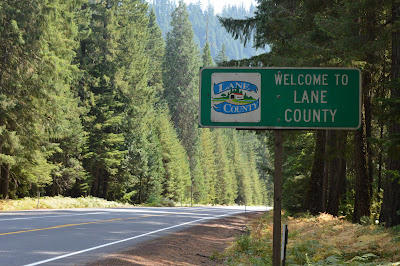Continue to Stand in the Gap: Lane County
 |
| Landis Cabin, Lane County, OR |
Lane County, named after the first Oregon Territorial Governor, Joseph Lane, is governed by a five-member Board of Commissioners including Jay
Bozievich, Pat Farr, Joe Berney, Laurie Trieger, and Heather Buch.
The County Sheriff is Clifton G. Harrold.
The presiding judge of the Lane County Circuit Court
is Debra K. Vogt.
The county seat is Eugene.
Lane County, and Lane County alone, is the West Region
of Oregon. That seems fitting as the large county stretches from the Cascade
Mountains to the Pacific Ocean, forming the southern border of Linn, Benton,
and Lincoln Counties. It makes up the southern portion of the Willamette Valley
and contains one of the state’s most populous cities, Eugene, as well as forested
wilderness to the east, rich farmland in the valleys, and ocean beaches to the
west. It is a microcosm of all western Oregon.
In earlier posts on Lane County, we mentioned the
history of the colleges and universities that began even before the Civil War. And
we looked at the Happy Danes of Junction City and a few Methodist circuit
riders.
 |
| Lane County, Oregon |
Enoch Pinkney Henderson was born in 1818 in Calloway,
Missouri. Licensed to preach by this new branch of Presbyterians in 1843, he
was a teacher and sometimes church speaker in the years before his marriage to
Elizabeth Schroyer in 1850 when he was about 32. He had been working to continue
his education during those years, for, while the Cumberland Presbyterians
wanted to relax the rules on education for their ministers, they still saw the
necessity for training. Enoch graduated from Cumberland Presbyterian College in
Waynesburg, Pennsylvania in 1855.
The next year he and his family headed for Oregon
where he had been invited to assume the duties as president of the new Columbia
College, a Cumberland Presbyterian institution in Eugene. This institution, one
of the earliest in Oregon and a rare co-ed campus was established in 1856 with
an opening student body of around 70 students. It had one building, newly built
for the school, which unfortunately was burned by an arsonist shortly after the
school opened. The college rented another building while they rebuilt, with the
student body reaching as much as 150. Sadly, the arsonist was still at large,
and the new building was also burned. A third one, with a façade of fireproof sandstone,
was erected, but other problems soon forced the college to close.
During these pre-Civil War days, political views were strong, and deep divides occurred even in church denominations. Rev. Henderson was anti-slavery and a “free soil” man. Among the pro-slavery faction in Oregon and the Presbyterian Church (which included the majority of the college board), there were fears he would take up an abolitionist stance, and he was ousted from the college presidency after about three years, and supplanted by a fiery pro-slavery man who promptly caused a scandal by physically attacking the editor of the local paper. He fled, and the college closed soon after.
Rev. Henderson, however, took a break in
California, then returned to Oregon in 1862, continuing his career in education
and church work. He was the principal of an academy in Harrisburg. From there
he went to Belle Passi (now a section of Woodburn, Oregon) where he was pastor
of Cumberland Presbyterian Church and taught school. He continued his teaching
and preaching around the state. In 1864 he was elected chief clerk of the
Oregon state senate; in 1870 he took the census for Lane County and from information
gleaned while doing that wrote a series of articles on the rich, untouched
resources of Lane County for the Oregonian.
He and his wife had seven children. He died at home in Eugene in 1893, and his services were held at the Cumberland Presbyterian Church in Eugene. He is one of a number of men - homesteaders, ministers, preachers - who had roots in the Second Great Awakening and helped establish Lane County's educational and spiritual foundations.
Pray we can restore the old wells.
PS: For those interested, the Oregon Strategic Prayer Call meets Friday by Zoom at 12:00 pm to pray for Oregon. This week includes prayer for Lane County.
Zoom Link: www.zoom.us/j/
Zoom Cloud Meetings app on Smartphone (download from your app store): Meeting ID: 5419997777 and password: 999777



Comments
Post a Comment